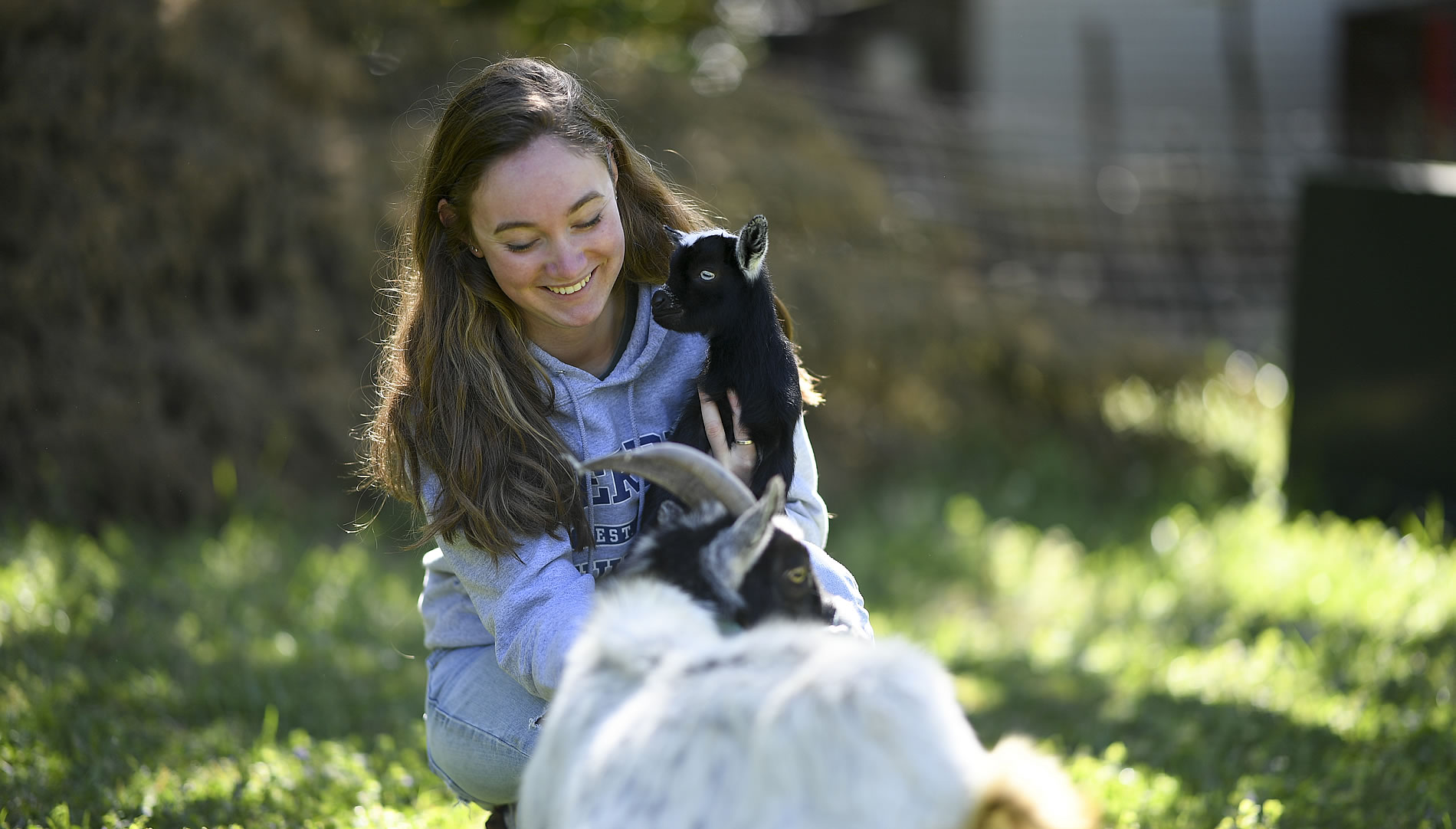If you’re drawn to a career working with animals, it’s wise to familiarize yourself with the host of vet school requirements you’ll need to complete during your undergraduate education.
The aspiring DVM’s guide to vet school requirements
As you embark on your veterinary medicine journey, you might find it helpful to get the perspective of practicing DVMs. We reached out to Dr. Sara Ochoa, a small animal and exotic veterinarian in Texas as well as a veterinary advisor for DogLab, to gain some perspective on how to approach the various vet school requirements.
1. Seek out as many animal experiences as you can
If you love to be surrounded by animals, now is the time to embrace that tendency. Gaining animal experience, activities involving animals without a veterinarian present, will help you become comfortable working with a variety of species. Dr. Ochoa says assisting at a horse stable, shelter or animal boarding facility are all options you might consider.
While veterinary schools don’t typically specify how many hours they expect, they do consider involvement in animal experience when reviewing your application. Data from the Association of American Veterinary Medical Colleges (AAVMC) shows applicants average around 1,100 hours of animal experience. That said, it’s more important that you focus on consistent involvement in quality activities. And you can begin accumulating animal experience well before starting college.
2. Complete all required coursework
Veterinary schools have pretty strict prerequisite course requirements. Most schools expect applicants to complete biology or zoology, biochemistry, English, inorganic chemistry and organic chemistry classes, but there’s a lot of divergence after that. You can research specifics by comparing schools using the Veterinary Medical School Admission Requirements (VMSAR) tool from the AAVMC. Because schools vary so much in their requirements, Dr. Ochoa suggests taking a focused approach.
“I recommend that students pick their top three to five schools and research what requirements they need to make sure that they fulfill them,” she explains.
It probably goes without saying that you want to do as well as possible in school, especially for required coursework. Accepted veterinary students have a mean overall GPA of 3.6 and a mean science GPA of 3.5.
3. Gain veterinary experience to see what the field is like
“Veterinary experience is the experience you get from working alongside a veterinarian, such as shadowing in a clinic or hospital,” Dr. Ochoa clarifies.
Shadowing and similar activities performed under the supervision of veterinarians are incredibly important to schools. Some programs require applicants complete a minimum number of hours to even be considered. Believe it or not, this is really a safeguard for you as a potential student.
“I try to talk openly and honestly to pre-vet students to make sure that they understand what life is like once school is over so they can be certain that this is the right path for them to follow,” Dr. Ochoa explains.
4. Tackle the GRE
Most vet schools still list the Graduate Record Examination (GRE) as an application component. Veterinary education is rigorous, so schools want to make sure they’re only admitting students who can handle the challenge. You may find it helpful to review the mean GRE percentile scores for accepted students.
To get ready for the exam, you might look into the numerous books and online resources available. “Taking a practice test will also help you prepare,” Dr. Ochoa advises.
5. Obtain excellent letters of evaluation
Letters of evaluation, also called letters of recommendation, are a key part of a strong application package. They provide outside opinions that can help admissions committees gain a better sense of who you are.
The Veterinary Medical College Application Service (VMCAS) applicant guide is a little vague — you can submit as few as three letters or as many as six. And it can be a combination of evaluations written by individuals as well as committee letters.
So how should you approach this section? Focus on quality. Three excellent letters will serve you much better than six substandard ones. If you’ve been working to gain veterinary experience, this shouldn’t be too difficult.
“The veterinarians who you work with should be willing to write you a letter of recommendation,” Dr. Ochoa notes. But she also says it’s important to have spent a fair amount of time with those DVMs, because it’s hard for them to write a good recommendation if they don’t know you very well.
6. Compose a thoughtful essay
While it’s easy to assume your grades and GRE scores are the most important criteria schools evaluate, don’t underestimate the importance of your essay. VMCAS incorporates a personal statement than must be 3,000 characters or less. You can see essay suggestions on the website, so spend some time thinking about your response. You want to be both thoughtful and truthful.
7. Ensure you meet all school-specific requirements
It’s a good idea to take a thorough look at VMSAR before it comes time to start filling out your online application. Expectations vary from school to school, so you don’t want to be caught off guard. When filling out VMCAS, there’s even a section to add supplemental coursework and essays as requested by individual programs.
8. Submit your completed VMCAS application
While you’ll clearly be working on your application requirements for vet school for a fair amount of time, you’ll need to sit down and piece everything together when completing your VMCAS application. That includes filling out basic personal information, entering all coursework you’ve completed, mentioning student organizations or clubs you’ve been involved with, noting achievements and more. Official transcripts, GRE scores and electronically submitted letters of evaluation are also required.
As far as timing goes, the VMCAS portal opens in May and closes sometime in September. Make sure all of your application components are submitted by the deadline—no late materials will be accepted.
Once you’ve submitted your applications, you might practice speaking about your experiences and future plans in case any of your intended schools include an interview component. And make sure you take some time to recognize how much you’ve already accomplished. It takes a lot of hard work and dedication to make it this far.
Start checking off your vet school requirements
It can be a little overwhelming to realize how many requirements for vet school you’ll need to complete, but don’t panic. Just take each element as it comes. As long as you stay organized and obtain a quality undergraduate education, you have every reason to believe a vet school acceptance letter could be in your future.
It’s clearly important to attend a college that can prepare you for a veterinary studies program. You’d be wise to choose a school that’s known for providing students with hands-on experience working with all types of animals, such as Berry College. To learn more about how you can start setting the stage for a veterinary career, visit our Animal Science program page.


